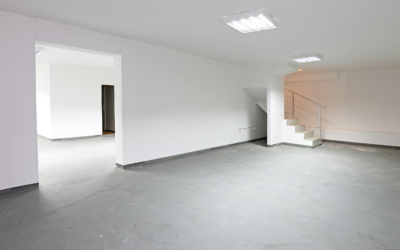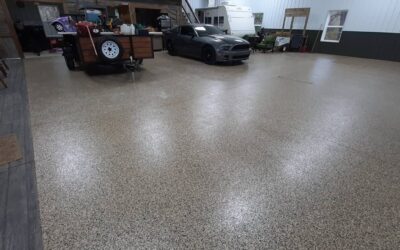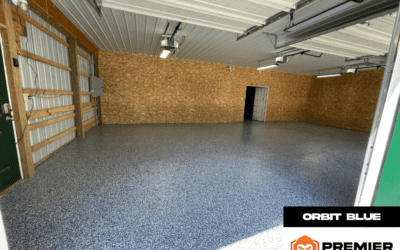If you’re looking for garage flooring options, your search has undoubtedly led you to a web of epoxy, polyaspartic, and polyurea floors. While they seem similar on the surface, each of these flooring solutions is a little different.
It can be confusing figuring out the differences and which option is right for you, so let this guide break it down for you in simple terms. By the time you’ve finished reading, you’ll have a pretty good idea whether epoxy, polyaspartic, or polyurea floor coatings are right for your project.
How Are Polyurea and Polyaspartic Floor Coatings Different from Epoxy?
When people talk about garage floor coatings, polyaspartic, polyurea, and epoxy coatings often jump to the top of the list. To the uninformed, they can seem interchangeable. In reality, each one is a little different. Let’s take a look.
- Polyurea is a kind of elastomer that’s often used to protect against abrasive or corrosive substances. It can be, but isn’t always, a polymer. It’s important to note that although they sound similar, polyurea is not the same as polyurethane. Polyurea cures more quickly than polyurethane.
- Polyaspartic is a type of polyurea formed when isocyanates create a urea linkage after being exposed to water or polyetheramines. Polyaspartics act like a cross between polyurea and epoxy.
- Epoxy is a kind of resin with a wide range of uses, including forming a tough, protective coating. It’s much more rigid than the other two.
Rather than delving too far into the science of these substances, let’s take a look at how epoxy and polyaspartics are used.
Benefits of Polyurea and Polyaspartic Coatings
Polyaspartic coatings are becoming increasingly popular due to their quick dry time and flexible nature, among other things.
Epoxy floor coating has been around for a while, and many people are already familiar with its properties. Let’s focus on what a polyaspartic garage floor coating system has to offer.
Cure Rate
One of the biggest advantages that a polyaspartic coat has over epoxy coating is its reduced cure time. Polyaspartic floor coatings can cure in as little as 30 minutes to an hour, which means your concrete floor is ready to go that much more quickly.
If the dry time is too short, you can always find a polyurea with a lower percentage of solids to give you a little more time.
On the other hand, an epoxy flooring system requires a five-day wait until you can drive your car into the garage.
Low Odor
If you’re sensitive to fumes, you might want to go with a polyurea application over the more fume-laden epoxy option. This is especially the case if you or your loved ones suffer from breathing issues or if you have children or pets around.
Flexible
Polyureas are extremely flexible compared to epoxy, making them more resistant to chips and cracks. Hardness is one of epoxy’s main attributes, but flexible coating systems can be more durable in some cases.
Polyureas contain 98% solids, making them stronger than epoxy while allowing them to retain more flexibility.
Durable
Polyaspartic coatings are durable enough to withstand heavy use, holding up to regular:
- Vehicle weight
- Dropped tools
- UV rays
- Weather fluctuations
- Pets and children
- Foot traffic
The application of a polyaspartic floor is one of the easiest things you can do to keep your garage looking great year after year.
Colorfast
Polyaspartic coatings are fade- and stain-resistant. The application of a color base coat is topped with a clear layer that offers UV protection, meaning your floors won’t yellow over time.
Years from now, your concrete floor will look new thanks to the application of a polyurea floor coating.
Customizable
Our polyaspartic coatings are customizable, so you can choose the color coat and design that works best for you. You might prefer a smooth, solid look, or you might want to add contrasting paint chips for added interest. We can match whatever style you’re looking for.
Wetting Ability
Polyurea has superior wetting ability, which refers to the degree to which it seeps into the ground beneath it. This is crucial for waterproofing because the penetration allows the coating to form a tight bond with the ground below.
Is a Polyaspartic Coating Right for You?
Now that you have a better idea of what polyurea flooring can do for a surface, it might be helpful to take some time to consider whether it’s the right choice for your floors.
Budget
Polyureas might seem like the obvious choice for your concrete flooring project at this point. But one thing to consider is the price. Epoxy flooring is considerably less expensive than polyurea coating, so if you’re on a tight budget, you might want to look at epoxy. However, with the benefits of polyurea you will save money in the long run by avoiding cracks, peeling, and repairs.
Weather
You must apply epoxy in temperatures over 55 degrees Fahrenheit, whereas you can apply polyaspartic flooring in temperatures as low as 30 degrees Fahrenheit.
While this isn’t a concern during the summer, if you’re planning on a project during cooler months, it’s worth considering.
Timeline
An epoxy flooring project will take just over a week to complete, so it’s best not to do it if you’re in a hurry. A polyurea floor will be done in about a day, so it’s the better option for those with a busy schedule.
UV Exposure
Polyaspartic coatings are immune to UV exposure, but epoxy floors will yellow or fade over time if exposed to sunlight. That’s why polyurea pool decks tend to be more popular than epoxy ones.
Use
Epoxy is more resistant to chemicals like battery acids, potentially making it a better option for mechanics or anyone who works with corrosive substances regularly.
Expert Polyurea and Polyaspartic Floor Coating Installer
Are you looking for a polyaspartic garage floor coating? Our floor coating experts can help. We offer fast, efficient service that will give you attractive new concrete floors in no time. Our team has years of experience and won’t be happy unless you love your new flooring.
Call us at 269-503-9315 or fill out a contact form for more information or to get started.



